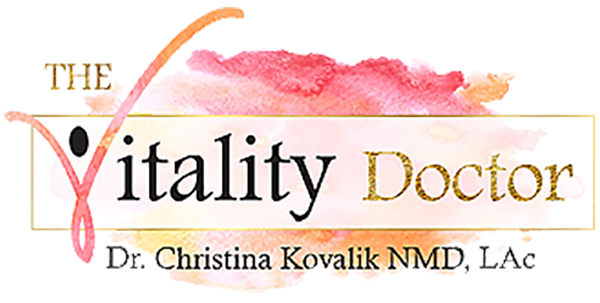Hormones play a vital role in regulating nearly every aspect of your health, including mood, energy, sleep, and even bone strength.
As you age, hormone fluctuations become more pronounced, particularly in the years leading up to menopause, known as the menopausal transition. This can make you feel like you’re losing connection to yourself and your body as things change.
While there are a lot of systems and hormones affected, there are the key hormones we’ll discuss today:
Key Hormones Affected:
- Estrogen and Progesterone Levels:
These female hormones regulate menstrual periods, mood, and bone density. Declining levels often lead to irregular menstrual cycles, mood swings, and even increased risks of bone loss. - Thyroid Hormone:
An underactive thyroid can significantly impact your energy levels, leading to weight gain, fatigue, and low mood. Proper thyroid function is essential for maintaining balance within the endocrine system. - Adrenal Glands:
Chronic stress wreaks havoc on the adrenal glands, leading to excessive cortisol production. This can exacerbate symptoms such as weight changes, poor sleep, and low stamina. - Pituitary Gland:
As a master gland, the pituitary gland helps regulate hormone production throughout the body, impacting everything from hormone fluctuations to metabolic processes.
The Common Symptoms of Hormonal Imbalance in Women Over 40
Recognizing hormonal imbalance symptoms is the first step to improving your health. If you suspect things have been different in your body, it’s important to share these concerns with your health care provider and not just brush these aside.
Here are some of the most common signs and how they manifest:
- Irregular Periods and Menstrual Changes
Changes in menstrual periods—such as skipped cycles, heavy bleeding, or shorter cycles—are often linked to fluctuating levels of estrogen and progesterone. Irregular menstrual cycles are a hallmark sign of the menopausal transition and may appear as early as your late 30s.
- Sleep Problems
Night sweats, insomnia, and disrupted sleep cycles are common during this stage of life. Lower estrogen levels can affect the body’s ability to regulate body temperature, leading to hot flashes and poor-quality sleep.Pro Tip: Keep your bedroom cool, and establish a calming bedtime routine to improve your sleep.
- Mood Changes and Brain Fog
Mood swings, irritability, and feelings of anxiety or depression are common emotional symptoms of hormonal imbalance. Many women also report brain fog, which can make it difficult to focus or retain information.
- Weight Changes
Unexplained weight gain or difficulty achieving weight loss can signal issues with hormonal regulation, particularly within the thyroid gland or adrenal glands. Hormonal shifts can also lead to increased belly fat, which is linked to declining progesterone levels and low estrogen.
- Vaginal Dryness and Low Sex Drive
As estrogen levels decline, many women experience vaginal dryness, discomfort during intimacy, and a reduced sex drive. These symptoms can impact sexual function, self-esteem, and relationships.
- Energy and Fatigue
Persistent fatigue, even after a full night’s rest, is a hallmark of hormonal imbalance. This may be linked to changes in thyroid hormone, cortisol, or progesterone levels.
- Physical Changes
- Hair Loss: Thinning hair is often linked to hormonal shifts, including changes in testosterone levels and the thyroid gland.
- Skin and Breast Tissue Changes: Fluctuating hormones can cause dryness, reduced elasticity, and tenderness in breast tissue.
- Bone Loss: Declining estrogen levels may weaken bones, increasing the risk of fractures and osteoporosis.
While these symptoms may sound like a lot to deal with, there are many things we can do to mitigate the effects of hormone changes. I’ll share some of these below, but first, let’s quickly discuss how imbalances are important to your overall health.
How Hormonal Imbalance Affects Overall Health
Untreated hormonal imbalances can lead to more serious health problems, including:
- Heart Disease: Changes in cholesterol levels and blood pressure may increase cardiovascular risks.
- Bone Density Loss: Reduced bone density can result in osteoporosis, especially post-menopause.
- Mental Health Challenges: Persistent anxiety, depression, and low mood can worsen without proper intervention.
- Reproductive Health Issues: Younger women may experience conditions like polycystic ovary syndrome (PCOS) or primary ovarian insufficiency, which impact fertility and menstrual regularity.
Did You Know? Even common symptoms like urinary incontinence and hot flashes can point to underlying hormonal imbalances.
How to Address Hormonal Imbalance
If you’ve found yourself nodding yes, that you’re experiencing some, or all, of the symptoms above, I feel for you. It’s a difficult challenge to navigate, but you don’t have to do so alone, or without support.
The good news? There are multiple ways to address these uncomfortable symptoms and restore balance.
- Hormone Therapy Options
- Hormone Replacement Therapy (HRT): Replenishes low estrogen and can alleviate severe symptoms like hot flashes and night sweats.
- Bioidentical Hormones: A more natural alternative tailored to your individual needs for relief.
- Lifestyle Changes for Hormonal Health
Small shifts can make a big difference:
- Healthy Diet: Incorporate hormone-friendly foods like leafy greens, fatty fish, and whole grains. Avoid a poor diet heavy in processed sugars and unhealthy fats.
- Exercise: Regular physical activity not only supports weight loss but also reduces stress and improves mood.
- Stress Management: Mindfulness practices like yoga, meditation, or acupuncture can support your adrenal glands and improve your overall balance.
- Medical Attention and Diagnostics
If you suspect a hormonal imbalance, working with a trusted healthcare provider is essential:
- Hormone Tests: Evaluate your progesterone levels, estrogen levels, and thyroid function.
- Physical Exam and Medical History: Identify the underlying causes of your symptoms.
Small Steps for Big Results
It can be easy to think you have to do all of the things right away to get things back to “normal.” You don’t need to make sweeping changes overnight, though.
Instead, focus on implementing small, manageable shifts that align with your health goals. This is where working with a professional is an enormous benefit. We can help when you have questions and we’ll be able to tailor a plan specifically for you and your body.
Here are some things to start with:
- Start by addressing your sleep problems with a consistent bedtime routine.
- Add hormone-balancing foods to your meals, like flaxseeds, avocados, and salmon.
- Prioritize self-care to reduce stress and support your emotional well-being.
“Good Health Starts With You: A proactive approach can transform how you feel every day.”
Advocate for Your Well-being
Many women are told their symptoms are “normal” as they age, but that doesn’t mean they have to endure them.
Normal is not optimal.
If you’ve been dismissed or left with unanswered questions, it’s time to seek a provider who listens and takes your concerns seriously.
What to Look for in a Provider:
- Someone who takes a holistic view of your medical history and lifestyle.
- Expertise in treating female hormone imbalance through both natural and medical approaches.
- Willingness to explore personalized treatment options like hormone therapy, dietary changes, and natural remedies.
Takeaway: Reclaim Your Balance and Vitality
Hormonal imbalance symptoms don’t have to define your life after 40.
By recognizing the signs of a hormonal imbalance, addressing underlying causes, and exploring treatment options, you can take control of your health and feel empowered to live life fully.
Ready to learn more? Discover how small lifestyle shifts can restore balance by downloading my guide to hormone health here.
To find out more Call Dr. Kovalik

